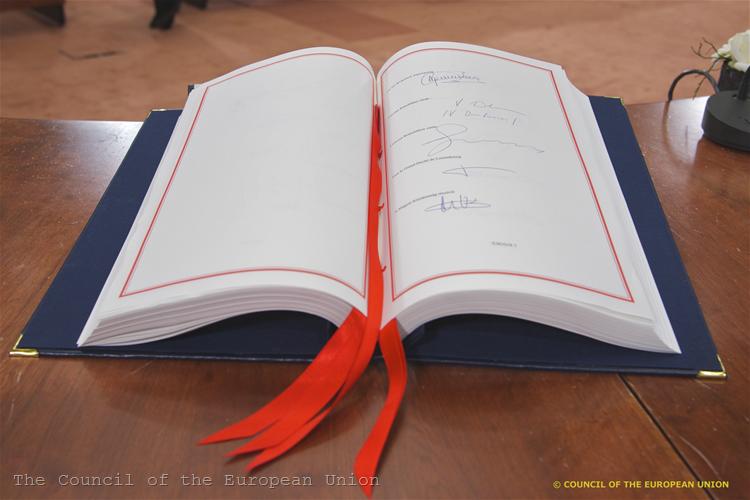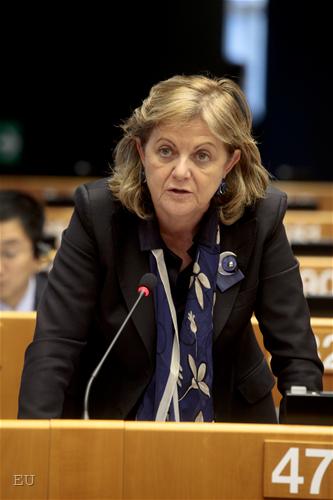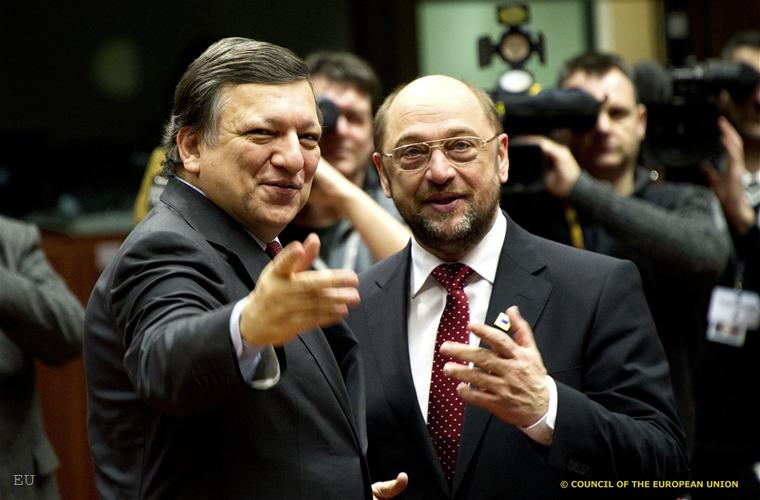Eurozone Plus Creates a Fiscal Compact Outside the EU
Ralitsa Kovacheva, December 11, 2011
 The 17 euro area countries, together with six non-euro countries (Bulgaria, Denmark, Latvia, Lithuania, Poland and Romania, which have also joined the Euro Plus Pact) will sign an intergovernmental agreement, committing to strengthen budgetary discipline and greater coordination of economic policies. This is the so called "fiscal compact", whose architects are Germany and France, and its "godfather" is ECB President Mario Draghi, who was the first to use exactly this expression.
The 17 euro area countries, together with six non-euro countries (Bulgaria, Denmark, Latvia, Lithuania, Poland and Romania, which have also joined the Euro Plus Pact) will sign an intergovernmental agreement, committing to strengthen budgetary discipline and greater coordination of economic policies. This is the so called "fiscal compact", whose architects are Germany and France, and its "godfather" is ECB President Mario Draghi, who was the first to use exactly this expression.
The governments of the Czech Republic and Sweden have to consult their national parliaments before taking any decision, and Hungary, although it initially refused to join, might rethink its position so as not to remain in isolation. Thus the only country that remained outside the "fiscal compact" was the UK.
It was the British veto that was the reason the member states to resort to an intergovernmental agreement, because after 10-hour discussions it became clear that there would be no unanimous support for Treaty changes. At an early morning press conference in Brussels Prime Minister David Cameron explained his position simply and clearly:  "What is on offers is not in Brittan’s interests, so I didn’t agree to it." Although, the prime minister added, "it is not easy when you are in a room with many other people who all want to press ahead, who all say forget about your safeguards, forget about your interests, let`s all just sign up to this thing together. It is sometimes the right thing to say, ‘I cannot do that, it is not in our national interest, I don’t want to put that in front of my parliament because I don’t think I can recommend it with a clear conscience, so I am going to say no and exercise my veto.'"
"What is on offers is not in Brittan’s interests, so I didn’t agree to it." Although, the prime minister added, "it is not easy when you are in a room with many other people who all want to press ahead, who all say forget about your safeguards, forget about your interests, let`s all just sign up to this thing together. It is sometimes the right thing to say, ‘I cannot do that, it is not in our national interest, I don’t want to put that in front of my parliament because I don’t think I can recommend it with a clear conscience, so I am going to say no and exercise my veto.'"
David Cameron explained that he was not opposed to the eurozone countries solving their problems separately, outside the European treaties, and wished them luck, but he could not allow "a treaty within a treaty" with no safeguards for the single market and "other key British interests."
"Very simply, in order to accept the reform of the treaty at 27 [countries], David Cameron asked for what we thought was unacceptable: a protocol to exonerate the UK from the financial services regulation," French President Nicolas Sarkozy was quoted saying by The Financial Times. "This is going to cost the UK dearly," a senior EU official told the newspaper, "they have antagonised everyone."
The big question is whether an agreement outside the EU framework will satisfy the markets as a sufficiently reliable one and whether it will be possible the European institutions, notably the Commission, to participate in the process. As you will read below, the Commission is to play an important role in supervising and coordinating budgetary policies. According to European Commission President Jose Manuel Barroso, there is a legal possibility for that to happen. If the treaty was properly drafted, it would fulfil its objective to strengthen governance in the euro area, Mr Barroso said.
 European Council President Herman Van Rompuy added that political commitment was as important as any legal instrument. In terms of automation, he added, if the countries committed to apply the rules it would have the same effect as if the treaty was changed. Still, as is clear from the statement of the eurozone leaders, the purpose of changing the Treaty remains valid.
European Council President Herman Van Rompuy added that political commitment was as important as any legal instrument. In terms of automation, he added, if the countries committed to apply the rules it would have the same effect as if the treaty was changed. Still, as is clear from the statement of the eurozone leaders, the purpose of changing the Treaty remains valid.
European Central Bank President Mario Draghi gave an important sign, saying that the intergovernmental agreement was "the basis for a good fiscal compact and more discipline in economic policy in the euro area members." As you know, Mario Draghi put the creation of a fiscal compact (and namely his term is used in the leaders' statement) as a condition the ECB to act more actively on debt markets.
The fiscal compact will contain the main elements described in the report of the European Council president, Herman Van Rompuy, as euinside explained in details:
Introduction of a balanced budget rule in the national law
The countries commit to maintain their national budgets balanced or in surplus (the annual structural deficit should not exceed 0.5% of the nominal GDP). The rule should be introduced in national constitutions (or equivalent legislative level), as the countries recognise the jurisdiction of the Court of Justice to verify the transposition of this rule at national level. In parallel, the rule will contain an automatic correction mechanism, which will be activated in the event of deviation. Mechanisms will be specific for each country and will be determined under principles proposed by the Commission.
Changes in the Excessive Deficit Procedure (EDP)
Countries in an EDP must submit for approval to the Commission and the Council “an economic partnership programme detailing the necessary structural reforms to ensure an effectively durable correction of excessive deficits.” Implementation of the programme, along with the annual budget plans will be monitored by the Commission and the Council.
More aromaticity in terms of the EDP for the eurozone countries will be introduced by applying the reverse majority voting rule. "As soon as a Member State is recognised to be in breach of the 3% ceiling by the Commission, there will be automatic consequences unless a qualified majority of euro area Member States is opposed. Steps and sanctions proposed or recommended by the Commission will be adopted unless a qualified majority of the euro area Member States is opposed."
Member States will also be obliged to report ‘ex ante’ on their national debt issuance plans.
In addition to these commitments, the countries call on the Council and European Parliament to adopt the new Commission’s proposals from 23 November to strengthen the economic and budgetary surveillance in the euro area and especially for countries experiencing serious difficulties until the next budget cycle.
As to the economic union, the parties engage to use more actively “enhanced cooperation on matters which are essential for the smooth functioning of the euro area, without undermining the internal market." These matters are not specifically mentioned in the statement, but Van Rompuy's report notes in particular labour market, pension and social security systems and taxation. All major economic policy reforms, planned by euro area member states, will be discussed and coordinated at the level of the euro area, the statement reads.
Regarding the form of governance, the eurozone leaders have agreed to meet regularly "at least twice a year."
Important changes in the ESM
Leaders engage the new tools, aimed at increasing the financial capacity of the temporary rescue fund EFSF to be implemented quickly, and the entry into force of the permanent European Stability Mechanism (ESM) to be accelerated so the fund to be operational by July 2012 rather than mid-2013, as originally planned. The condition is the ESM treaty to be ratified by the member states representing 90% of the fund's capital. The treaty, however, will be changed in two very significant directions.
One is private sector's involvement: "As regards the Private Sector Involvement (PSI) we have made a major change to our doctrine: from now on we will strictly adhere to the IMF principles and practises. Or to put it more bluntly: our first approach to PSI, which had a very negative effect on the debt markets, is now officially over," President Herman Van Rompuy said. This means that investors are no longer threatened by a repetition of the Greek case, where they are forced to write off "voluntarily" 50% of the Greek debt. The participation of private creditors was a key condition of Germany a year ago, when the ESM was created, but even a week ago Chancellor Merkel signalled a retreat from this position.
The second change is that the voting rules in the ESM will be changed and an "emergency procedure" will be included. "The mutual agreement rule will be replaced by a qualified majority of 85%, in case the Commission and the ECB conclude that an urgent decision related to financial assistance is needed when the financial and economic sustainability of the euro area is threatened." This decision is awaiting the confirmation of the Finnish parliament.
As a sign that the IMF will play a more active role in the eurozone, the countries in the monetary union commit to provide additional resources to the fund - up to 200 billion euros - in the form of bilateral loans. In parallel, the countries expect the same from the international community.
Regarding the role of the ECB, the euro leaders welcome "the readiness of the ECB to act as an agent for the EFSF in its market operations." A statement to that effect was made a day earlier by the bank’s president, Mario Draghi. The ECB will prepare the technical capacities to intervene in bond markets for and on behalf of the EFSF, if the fund requests this. It does not involve our balance sheet because we act as an agent, Mario Draghi explained.
The agreement will be signed no later than March 2012, and then it must be ratified by national parliaments. At the European Council in March President Herman Van Rompuy, in cooperation with European Commission President Jose Manuel Barroso and Eurogroup President Jean-Claude Juncker must submit a report on a further deepening of fiscal integration and relations between the EU and the euro area.
 | © The Council of the European Union
| © The Council of the European Union Klaus Regling | © Council of the EU
Klaus Regling | © Council of the EU Mario Centeno | © Council of the EU
Mario Centeno | © Council of the EU Mario Centeno | © Council of the EU
Mario Centeno | © Council of the EU | © EU
| © EU | © EU
| © EU | © euinside
| © euinside